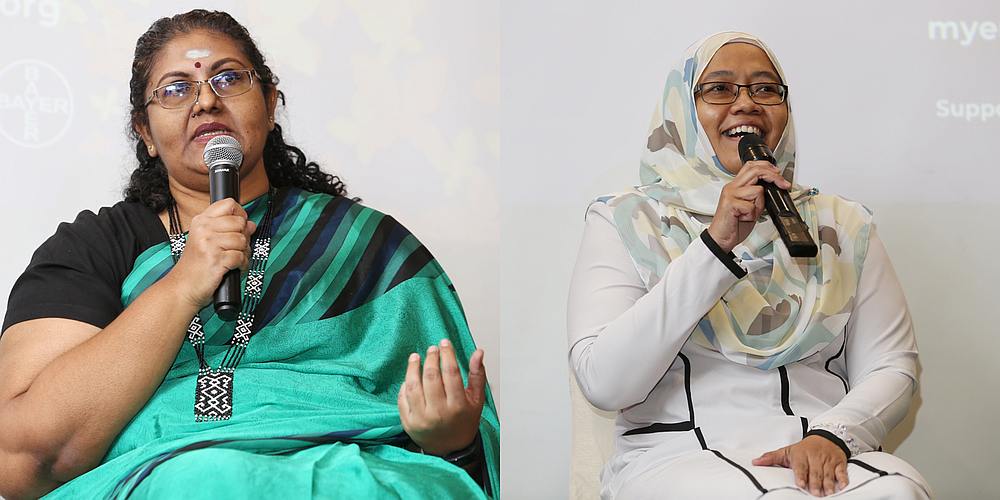KUALA LUMPUR, Sept 22 — Ghanthimathi Subramaniam was constantly told as a young girl that period pain was something that all women had to endure.
At the age of 11, she began experiencing intense period cramps and heavy flow, the likes of which she never saw her friends or sisters going through.
The cramps led to her fainting repeatedly on the school field during physical education and she was sent to the counsellor after teachers assumed she was faking her symptoms to skip class.
Years of isolation and pain went by and it wasn’t until the age of 26 when Ghanthimathi finally heard the word “endometriosis” for the first time after she fainted in front of a gynaecologist during a business meeting.
“I was visiting a gynaecologist as part of my job and I fainted there due to excruciating pain.
“The gynaecologist did an ultrasound on me and found a cyst in my uterus.
“She told me, ‘You have endometriosis’ and it was the first time in my life hearing that word.
“I finally had a name for my condition after nearly 15 years,” said Ghanthimathi.
The 47-year-old PhD student was speaking at the launch of the MyEndosis website, a platform that allows Malaysians with endometriosis to access information and support.
Endometriosis is an inflammatory condition that occurs when the endometrium, a layer of tissue that normally lines the inside of the uterus, grows outside the womb in other tissues or organs.
One in 10 women of reproductive age are affected by the condition and common symptoms include chronic pelvic pain, period pain, pain during or after sexual intercourse, and infertility.
However, KPJ Damansara Specialist Hospital consultant obstetrician and gynaecologist Dr Imelda Balchin warned that the figure is likely to be an underestimate due to lack of awareness and the normalisation of period pain in society.

“This figure is an underestimate because the majority of women who have endometriosis don’t even know that they have it.
“They don’t know that they have it until after at least eight to 10 years of suffering.
“This is before they are diagnosed with the condition, before they even heard the words, ‘You have endometriosis.’
“With endometriosis awareness, we want people to be able to seek help knowing that women do not have to suffer from their pain,” said Dr Imelda.
Social taboos another obstacle to getting help
Leila Azura Mohd Daniel, 40, initially thought that her period pains would go away after she settled down and started having children.
While her periods were not unbearable in her teenage years, she started experiencing severe period pains at 25 while she was busy building up her career.
After looking up her symptoms online, she suspected that she had endometriosis but was too afraid to seek help because at the time, she thought that only married women should see a gynaecologist.
“I felt scared because I didn’t know about this disease and I was also afraid to go to the gynaecologist because I was not yet married.
“Worried and also ashamed to seek expert advice, I stayed alone (with this condition) for more than two years,” said Leila.
She only mustered up the courage to see a gynaecologist after getting married and being told by her husband that her pain was far from normal.

“I had to take at least one day off from work every month. The pain would occur during the week before my period, during the period, and after it was over too.
“I only had seven days out of the month where I was pain-free. That’s when I knew something was wrong.
“My family told me that this was normal and that the pain would go away after I got married and had babies.
“I had to endure the pain and I only sought the help of a gynaecologist six months after I got married.”
While there is no cure for endometriosis, early intervention is key to slow down its progression, relieve symptoms, improve quality of life, and prevent recurrence of the condition.
KPJ Tawakal KL Specialist Hospital consultant obstetrician and gynaecologist Dr Patricia Lim Su-Lyn said Ghanthimathi’s and Leila’’s stories of getting diagnosed after years of suffering in silence are echoed by many patients she has encountered over the years.
She highlighted several treatment options available to manage the condition, from hormonal therapies to hysterectomies.
“It is important for patients to discuss with their obstetrician and gynaecologist on a long-term management plan so that the condition does not worsen and recur as well as to prevent more surgeries,” said Dr Lim.
She also debunked the myth that pregnancy cures endometriosis, explaining that while the increased levels of progesterone in the body during pregnancy does alleviate endometriosis symptoms, they usually return after the person has given birth.

Endometriosis Association of Malaysia (MyEndosis) hopes to break the silence surrounding endometriosis with the launch of its new website supported by Bayer Co. (Malaysia) Sdn Bhd.
MyEndosis founder and president Surita Mogan, who has endometriosis herself, hopes that by making information and support readily available, the organisation can encourage people with endometriosis to step forward and find help.
“Please believe a person when they say they are in pain. We should be addressing the lack of awareness in the community and making sure that everybody knows about endometriosis.
“A lack of awareness of endometriosis and social taboos surrounding the disease are the common factors associated with the delay in seeking treatment.
“Many women live in silence and pain because they don’t know what is normal and what isn’t when it comes to menstrual health,” said Surita.
For more information on endometriosis, visit the MyEndosis website.






















